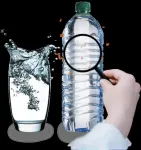(Press-News.org) MINNEAPOLIS — People who eat more red meat, especially processed red meat like bacon, sausage and bologna, are more likely to have a higher risk of cognitive decline and dementia when compared to those who eat very little red meat, according to a study published in the January 15, 2025, online issue of Neurology®, the medical journal of the American Academy of Neurology.
“Red meat is high in saturated fat and has been shown in previous studies to increase the risk of type 2 diabetes and heart disease, which are both linked to reduced brain health,” said study author Dong Wang, MD, ScD, of Brigham and Women’s Hospital in Boston. “Our study found processed red meat may increase the risk of cognitive decline and dementia, but the good news is that it also found that replacing it with healthier alternatives, like nuts, fish and poultry, may reduce a person’s risk.”
To examine the risk of dementia, researchers included a group of 133,771 people with an average age of 49 who did not have dementia at the start of the study. They were followed up to 43 years. Of this group, 11,173 people developed dementia.
Participants completed a food diary every two to four years, listing what they ate and how often.
Researchers defined processed red meat as bacon, hot dogs, sausages, salami, bologna and other processed meat products. They defined unprocessed red meat as beef, pork, lamb and hamburger. A serving of red meat is three ounces, about the size of a deck of cards.
Researchers calculated how much red meat participants ate on average per day.
For processed red meat, they divided participants into three groups. The low group ate an average of fewer than 0.10 servings per day; the medium group ate between 0.10 and 0.24 servings per day; and the high group, 0.25 or more servings per day.
After adjusting for factors such as age, sex and other risk factors for cognitive decline, researchers found that participants in the high group had a 13% higher risk of developing dementia compared to those in the low group.
For unprocessed red meat, researchers compared people who ate an average of less than one half serving per day to people who ate one or more servings per day and did not find a difference in dementia risk.
To measure subjective cognitive decline, researchers looked at a different group of 43,966 participants with an average age of 78. Subjective cognitive decline is when a person reports memory and thinking problems before any decline is large enough to show up on standard tests.
The subjective cognitive decline group took surveys rating their own memory and thinking skills twice during the study.
After adjusting for factors such as age, sex and other risk factors for cognitive decline, researchers found that participants who ate an average of 0.25 servings or more per day of processed red meat had a 14% higher risk of subjective cognitive decline compared to those who ate an average of fewer than 0.10 servings per day.
They also found people who ate one or more servings of unprocessed red meat per day had a 16% higher risk of subjective cognitive decline compared to people who ate less than a half serving per day.
To measure objective cognitive function, researchers looked at a different group of 17,458 female participants with an average age of 74. Objective cognitive function is how well your brain works to remember, think and solve problems.
This group took memory and thinking tests four times during the study.
After adjusting for factors such as age, sex and other risk factors for cognitive decline, researchers found that eating higher processed red meat was associated with faster brain aging in global cognition with 1.61 years with each additional serving per day and in verbal memory with 1.69 years with each additional serving per day.
Finally, researchers found that replacing one serving per day of processed red meat with one serving per day of nuts and legumes was associated with a 19% lower risk of dementia and 1.37 fewer years of cognitive aging. Making the same substitution for fish was associated with a 28% lower risk of dementia and replacing with chicken was associated with a 16% lower risk of dementia.
“Reducing how much red meat a person eats and replacing it with other protein sources and plant-based options could be included in dietary guidelines to promote cognitive health,” said Wang. “More research is needed to assess our findings in more diverse groups.”
A limitation of the study was that it primarily looked at white health care professionals, so the results might not be the same for other race, ethnic and non-binary sex and gender populations.
The study was supported by the National Institutes of Health.
Discover more about dementia at BrainandLife.org, from the American Academy of Neurology. This resource also offers a magazine, podcast, and books that connect patients, caregivers and anyone interested in brain health with the most trusted information, straight from the world’s leading experts in brain health. Follow Brain & Life® on Facebook, X, and Instagram.
The American Academy of Neurology is the leading voice in brain health. As the world’s largest association of neurologists and neuroscience professionals with more than 40,000 members, the AAN provides access to the latest news, science and research affecting neurology for patients, caregivers, physicians and professionals alike. The AAN’s mission is to enhance member career fulfillment and promote brain health for all. A neurologist is a doctor who specializes in the diagnosis, care and treatment of brain, spinal cord and nervous system diseases such as Alzheimer's disease, stroke, concussion, epilepsy, Parkinson's disease, multiple sclerosis, headache and migraine.
Explore the latest in neurological disease and brain health, from the minds at the AAN at AAN.com or find us on Facebook, X, Instagram, LinkedIn, and YouTube.
END
Is eating more red meat bad for your brain?
Processed red meat linked to increased risk of dementia
2025-01-15
ELSE PRESS RELEASES FROM THIS DATE:
How does Tourette syndrome differ by sex?
2025-01-15
MINNEAPOLIS — Tourette syndrome is currently diagnosed about three times more frequently in males than in females. A new study finds that female individuals are less likely to be diagnosed with the syndrome, take longer to receive a diagnosis and are older when they are diagnosed than male individuals. The study is published in the January 15, 2025, online issue of Neurology®, the medical journal of the American Academy of Neurology.
Tourette syndrome is a neurodevelopmental disorder defined by ...
Red meat consumption increases risk of dementia and cognitive decline
2025-01-15
Red meat consumption is an established risk factor for chronic conditions, including cardiovascular disease and type 2 diabetes. A new study by investigators from Mass General Brigham, Harvard T.H. Chan School of Public Health, and the Broad Institute of MIT and Harvard found that eating greater quantities of red meat, especially in processed forms, increased risk for dementia, too. Results, published online on January 15, 2025, in Neurology®, the medical journal of the American Academy of Neurology, highlight that replacing processed red meat with protein sources like nuts and legumes or fish may decrease dementia risk by approximately 20 percent.
“Dietary ...
Study reveals how sex and racial disparities in weight loss surgery have changed over 20 years
2025-01-15
Racial disparities decreased slightly, but sex disparities increased significantly over 20-year period
Fewer Black people and men underwent weight loss surgery than other racial groups and women, respectively
A new study by Mass General Brigham investigators shows persistent racial disparities and growing sex disparities between patients who discussed and received weight loss surgery between 2000 and 2020. Using artificial intelligence to analyze the medical records of more than 120,000 patients with obesity, researchers found that Black people ...
Ultrasound-directed microbubbles could boost immune response against tumours, new Concordia research suggests
2025-01-15
A new paper by a team of Concordia researchers from the departments of Biology and Physics proposes a novel method of fighting cancer tumours that uses ultrasound-guided microbubbles — a technology already widely used in medical imaging and drug delivery.
Writing in the journal Frontiers in Immunology, the researchers describe a process that uses ultrasound to modify the behaviour of cancer-fighting T cells by increasing their cell permeability. They examined how this can influence the release of more than 90 kinds of cytokines, a type of signalling molecule crucial for immune response.
The researchers targeted freshly isolated human immune cells with tightly ...
In small preliminary study, fearful pet dogs exhibited significantly different microbiomes and metabolic molecules to non-fearful dogs, suggesting the gut-brain axis might be involved in fear behavior
2025-01-15
In small preliminary study, fearful pet dogs exhibited significantly different microbiomes and metabolic molecules to non-fearful dogs, suggesting the gut-brain axis might be involved in fear behaviors
Article URL: https://journals.plos.org/plosone/article?id=10.1371/journal.pone.0315374
Article title: Altered microbiome and metabolome profiling in fearful companion dogs: An exploratory study
Author countries: Italy
Funding: The author(s) received no specific funding for this work. END ...
Examination of Large Language Model "red-teaming" defines it as a non-malicious team-effort activity to seek LLMs' limits and identifies 35 different techniques used to test them
2025-01-15
Examination of Large Language Model "red-teaming" defines it as a non-malicious team-effort activity to seek LLMs' limits and identifies 35 different techniques used to test them
Article URL: https://journals.plos.org/plosone/article?id=10.1371/journal.pone.0314658
Article title: Summon a demon and bind it: A grounded theory of LLM red teaming
Author countries: US, Denmark
Funding: VILLUM Foundation, grant No. 37176: ATTiKA: Adaptive Tools for Technical Knowledge Acquisition. The funders had no role in study design, data collection ...
Most microplastics in French bottled and tap water are smaller than 20 µm - fine enough to pass into blood and organs, but below the EU-recommended detection limit
2025-01-15
Most microplastics in French bottled and tap water are smaller than 20 µm - fine enough to pass into blood and organs, but below the EU-recommended detection limit for water quality assessments.
####
Article URL: https://journals.plos.org/water/article?id=10.1371/journal.pwat.0000250
Article Title: Majority of potable water microplastics are smaller than the 20 μm EU methodology limit for consumable water quality
Author Countries: Denmark, France
Funding: This work and the PhD fellowship of O.H. is funded by an 80Prime CNRS grant «4DμPlast» (G.L.R, J.E.S.). This publication was supported by ANR-20-CE34-0014 ATMO-PLASTIC (G.L.R, J.E.S.) and the Plasticopyr ...
A tangled web: Fossil fuel energy, plastics, and agrichemicals discourse on X/Twitter
2025-01-15
An analysis of the nine top players in the U.S. fossil fuel-derived hydrocarbon industries (oil/gas, plastics, and agrichemicals) shows tight linkages across the three different sectors, with news media, other petrochemical industry players, and politicians also frequently tagged, according to a study published January 15, 2025 in the open-access journal PLOS Climate by Alaina Kinol from Northeastern University, United States, and colleagues.
Previous research on connections between the fossil fuel and plastics sectors and ...
This fast and agile robotic insect could someday aid in mechanical pollination
2025-01-15
CAMBRIDGE, MA — With a more efficient method for artificial pollination, farmers in the future could grow fruits and vegetables inside multilevel warehouses, boosting yields while mitigating some of agriculture’s harmful impacts on the environment.
To help make this idea a reality, MIT researchers are developing robotic insects that could someday swarm out of mechanical hives to rapidly perform precise pollination. However, even the best bug-sized robots are no match for natural pollinators like bees when it comes to endurance, speed, and maneuverability.
Now, inspired by the anatomy of these natural pollinators, the researchers ...
Researchers identify novel immune cells that may worsen asthma
2025-01-15
Hamilton, ON (January 15, 2025) – Researchers at McMaster University have made an important discovery in the field of asthma research, identifying a new population of immune cells that may play a crucial role in the severity of asthma symptoms.
The study, published in Science Translational Medicine on Jan. 15, 2025, sheds light on the complex mechanisms behind severe asthma and opens new avenues for potential treatments.
Asthma is a chronic respiratory condition characterized by inflammation and narrowing of the airways, leading to difficulty breathing. Severe ...
LAST 30 PRESS RELEASES:
Weight-loss wonder pills prompt scrutiny of key ingredient
Nonprofit leader Diane Dodge to receive 2026 Penn Nursing Renfield Foundation Award for Global Women’s Health
Maternal smoking during pregnancy may be linked to higher blood pressure in children, NIH study finds
New Lund model aims to shorten the path to life-saving cell and gene therapies
Researchers create ultra-stretchable, liquid-repellent materials via laser ablation
Combining AI with OCT shows potential for detecting lipid-rich plaques in coronary arteries
SeaCast revolutionizes Mediterranean Sea forecasting with AI-powered speed and accuracy
JMIR Publications’ JMIR Bioinformatics and Biotechnology invites submissions on Bridging Data, AI, and Innovation to Transform Health
Honey bees navigate more precisely than previously thought
Air pollution may directly contribute to Alzheimer’s disease
Study finds early imaging after pediatric UTIs may do more harm than good
UC San Diego Health joins national research for maternal-fetal care
New biomarker predicts chemotherapy response in triple-negative breast cancer
Treatment algorithms featured in Brain Trauma Foundation’s update of guidelines for care of patients with penetrating traumatic brain injury
Over 40% of musicians experience tinnitus; hearing loss and hyperacusis also significantly elevated
Artificial intelligence predicts colorectal cancer risk in ulcerative colitis patients
Mayo Clinic installs first magnetic nanoparticle hyperthermia system for cancer research in the US
Calibr-Skaggs and Kainomyx launch collaboration to pioneer novel malaria treatments
JAX-NYSCF Collaborative and GSK announce collaboration to advance translational models for neurodegenerative disease research
Classifying pediatric brain tumors by liquid biopsy using artificial intelligence
Insilico Medicine initiates AI driven collaboration with leading global cancer center to identify novel targets for gastroesophageal cancers
Immunotherapy plus chemotherapy before surgery shows promise for pancreatic cancer
A “smart fluid” you can reconfigure with temperature
New research suggests myopia is driven by how we use our eyes indoors
Scientists develop first-of-its-kind antibody to block Epstein Barr virus
With the right prompts, AI chatbots analyze big data accurately
Leisure-time physical activity and cancer mortality among cancer survivors
Chronic kidney disease severity and risk of cognitive impairment
Research highlights from the first Multidisciplinary Radiopharmaceutical Therapy Symposium
New guidelines from NCCN detail fundamental differences in cancer in children compared to adults
[Press-News.org] Is eating more red meat bad for your brain?Processed red meat linked to increased risk of dementia


